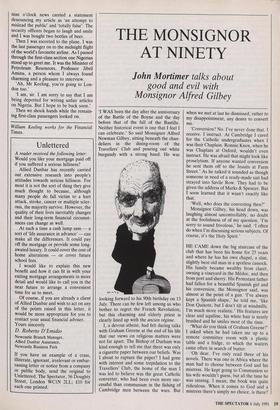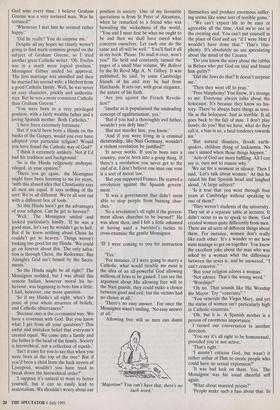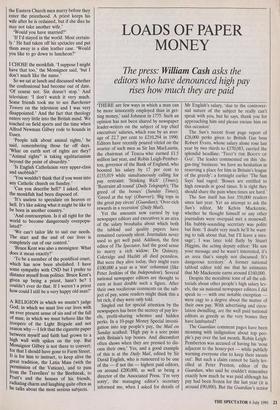THE MONSIGNOR AT NINETY
John Mortimer talks about
good and evil with Monsignor Alfred Gilbey
`I WAS born the day after the anniversary of the Battle of the Boyne and the day before that of the fall of the Bastille. Neither historical event is one that I feel I can celebrate.' So said Monsignor Alfred Newman Gilbey, sitting beneath the chan- deliers in the dining-room of the Travellers' Club and pouring out white burgundy with a strong hand. He was looking forward to his 90th birthday on 13 July. There can be few left among us who bother to regret the French Revolution; but this charming and elderly priest is clearly lined up with the ancien regime.
I, a devout atheist, had felt during talks with Graham Greene at the end of his life that our views on religious matters were not far apart. The Bishop of Durham was kind enough to tell me that there was only a cigarette paper between our beliefs. Was I about to rupture the paper? I had gone with interest and some trepidation to the Travellers' Club, the home of the man I was led to believe was the great Catholic converter, who had been even more suc- cessful than communism in the fishing of Cambridge men between the wars. But when we met at last he dismissed, rather to my disappointment, any desire to convert me.
`Conversion? No. I've never done that. I receive. I instruct. At Cambridge I cared for the Catholic undergraduates when I was their Chaplain. Ronnie Knox, when he was Chaplain at Oxford, wouldn't even instruct. He was afraid that might look like proselytism. If anyone wanted conversion he sent them off to the Jesuits at Farm Street.' As he talked it sounded as though someone in need of a ready-made suit had strayed into Savile Row. They had to be given the address of Marks & Spencer. But I soon learned that it wasn't exactly like that.
`Well, who does the converting then?'
Monsignor Gilbey, his head down, was laughing almost uncontrollably, no doubt at the foolishness of of my question. `I'm sorry to sound frivolous,' he said. 'I often do when I'm discussing serious subjects. Of course, it's the Holy Spirit.'
HE CAME down the big staircase of the club that has been his home for 25 years and where he has his own chapel, a slim, slightly bent old man in a spotless cassock. His family became wealthy from claret, owning a vineyard in the Medoc, and then from port and sherry. His Protestant father had fallen for a beautiful Spanish girl and his conversion, the Monsignor said, was almost at the point of a gun. 'I've always kept a Spanish shape,' he told me, 'like Don Quixote, but I don't tilt at windmills. I'm much more realistic.' His features are clear and aquiline, his white hair is neatly brushed and he smiles most of the time.
'What do you think of Graham Greene?' I asked when he had taken me up to a remote committee room with a plastic table and a fridge, to which the waiters came often in search of butter.
`Oh dear. I've only read three of his novels. There was one in Africa where the man had to choose between God and his mistress. He kept going to Communion so his wife wouldn't guess, but all the time he was sinning. I mean, the book was quite ridiculous. When it comes to God and a mistress there's simply no choice, is there? God wins every time. I believe Graham Greene was a very tortured man. Was he tortured?'
`Whenever I met him he seemed rather happy.'
`Did he really? You do surprise me.'
Despite all my hopes we clearly weren't going to find much common ground on the subject of Graham Greene, so I tried ' another great Catholic writer. 'Oh, Evelyn was in a much more logical position.' Monsignor Gilbey smiled his approval. `His first marriage was annulled and then he married his second wife; a Herbert from a good Catholic family. Well, he was never an easy character, prickly and authorita- rian. But he was a more consistent Catholic than Graham Greene.'
`You were born to a very privileged position, with a fairly wealthy father and a loving Spanish mother. Both Catholics.'
`I have been extremely fortunate.'
`But if you'd been born a Hindu on the banks of the Ganges, would you ever have adopted your particular religion? Would you have found the Catholic way of God?'
`I think it extremely unlikely. Not if I'd had his tradition and background.'
`So is the Hindu religiously underpri- vileged, in your opinion?'
`There you go again,' the Monsignor might have been listening to me for years, `with this absurd idea that Christianity says all men are equal. It says nothing of the sort! We're all different. We're all sent out with a different box of tools.'
`So this Hindu hasn't got the advantages of your religion. Can he get to heaven?'
`Well.' The Monsignor smiled and looked particularly kindly. 'If he was a good man, let's say he wouldn't go to hell. But if he knew nothing about Christ he couldn't get to heaven.' Things weren't looking too good for my Hindu. 'We could go on forever about this. The only salva- tion is through Christ, the Redeemer. But Almighty God isn't bound by the Sacra- ments.'
`So the Hindu might be all right?' The Monsignor nodded, but I was afraid this remote Indian, however moral his be- haviour, was beginning to bore him a little. I had, however, one more question.
`So if my Hindu's all right, what's the point of your whole structure of beliefs, and Catholic observances?'
`Because ours is the covenanted way. We have a covenant with God. But you know what I get from all your questions? This awful and mistaken belief that everyone's created equal. We come into a family and the father is the head of the family. Society is hierarchical, not a collection of equals.'
`Isn't it easy for you to say that when you were born at the top of the tree? But if you'd been a child from the back streets of Liverpool, wouldn't you have tried to break down the hierarchical order?'
`I suppose it's natural to want to better yourself, but it can so easily lead to materialism. We shouldn't worry about our position in society. One of my favourite quotations is from St Peter of Alcantara, when he remarked to a friend who was bewailing the wickedness of the world, "You and I must first be what we ought to be and then we shall have cured what concerns ourselves. Let each one do the same and all will be well." You'll find it all in my book. Please. Do mull it over, won't you?' He held and constantly turned the pages of a small blue volume, We Believe by the Rt Revd Mgr A. N. Gilbey. It was published, he said, by some Cambridge friends of his and may be had from Hatchards. It sets out, with great elegance, the nature of his faith.
`Are you against the French Revolu- tion?'
`Insofar as it popularised the misleading concept of egalitarianism, yes.'
`But if you had a thoroughly evil father, wouldn't you defy him?'
`But not murder him, you know.'
`And if you were living in a criminal dictatorship, like Nazi Germany, wouldn't a violent revolution be justified?'
`It never works. If you're born into a country, you're born into a going thing. If there's a revolution you never get to the end of it. I don't believe one man one vote is a sort of moral law.'
`But you supported Franco. He started a revolution against the Spanish govern- ment.'
`It was a government that didn't seem able to stop people from burning chur- ches.'
`So a revolution's all right if the govern- ment allows churches to be burned?' He was silent then, and I felt a little ashamed at having used a barrister's tactics to cross-examine the gentle Monsignor.
`IF I were coming to you for instruction `Yes.'
`For instance, if I were going to marry a Catholic, what would trouble me most is the idea of an all-powerful God allowing millions of Jews to be gassed. I can see the argument about His allowing free will to the Nazi guards, they could make a choice between good and evil; but the victims had no choice at all.'
`There's no easy answer.' For once the Monsignor wasn't smiling. 'No easy answer at all.'
`Allowing free will so men can damn `Majorisrn? You can't have that, there's no such word.' themselves and produce enormous suffer- ing seems like some sort of terrible game.'
`We can't expect life to be easy or agreeable all the time. And we're not at the creating end. You can't put yourself in the place of God and say "if I were Him I wouldn't have done that." That's blas- phemy. It's absolutely no use speculating about the mind of the Creator.'
`Do you know the story about the rabbis in Belsen who put God on trial and found him guilty?'
Did the Jews do that? It doesn't surprise me.'
`Then they went off to pray.'
`Pure blasphemy! You know, it's strange to me. Everyone always talks about the holocaust. It's because they know no his- tory. There've always been things as terri- ble as the holocaust. Just as terrible. It all goes back to the fall of man. I don't play bowls; do you? But we have, what do they call it, a bias in us, a fatal tendency towards sin.'
`But natural disasters, floods earth- quakes, children dying of leukaemia. No one's sinned when those things happen.'
`Acts of God are more baffling. All I can say is, ours not to reason why.'
We sat for a moment in silence. Then I said, 'Let's talk about women.' At this he raised his fine Spanish head and laughed aloud. 'A large subject!'
`Is it true that you went through four years at Cambridge without speaking to one of them?'
`They weren't students of the university. They sat at a separate table at lectures. It didn't occur to us to speak to them. God created women quite differently from men. There are all sorts of different things about them. For instance, women don't really like each other. It's a wonder to me how nuns manage to get on together. You know the excellent joke about the man who was asked by a woman what the difference between the sexes is, and he answered, "I can't conceive." ' `But your religion adores a woman.' `Not adores. That's the wrong word.' `Worships?'
`Oh no. That sounds like His Worship the Mayor. Try "venerates".'
`You venerate the Virgin Mary, and yet the status of women isn't particularly high in Catholic countries.'
`Oh, but it is. A Spanish mother is a person of enormous importance.'
I turned our conversation in another direction.
`You say it's all right to be homosexual, provided you're not active.'
`That's right.'
`I mustn't criticise God, but wasn't it rather unfair of Him to create people who could have no sexual expression?'
`It was bad luck on them. Yes.' The Monsignor was his usual cheerful self again.
`What about married priests?'
`People make such a fuss about that. In the Eastern Church men marry before they enter the priesthood. A priest keeps his wife after he is ordained, but if she dies he may not take another wife.'
`Would you have married?'
`If I'd stayed in the world. Most certain- ly.' He had taken off his spctacles and put them away in a slim leather case. 'Would you like to go down to luncheon?'
I CHOSE the monkfish. 'I suppose I might have that too,' the Monsignor said, 'but I don't much like the name.'
So we sat at lunch and discussed whether the confessional had become out of date. `Of course not. Sin doesn't stop.' And television: 'I don't watch it very much. Some friends took me to see Barchester Towers on the television and I was very disappointed.' And the fact that theology enters very little into the British mind. We touched on field sports and the time when Alfred Newman Gilbey rode to hounds in Essex.
`People talk about animal rights,' he said, remembering those far off days. `What on earth sort of rights are they? "Animal rights" is taking egalitarianism beyond the point of absurdity.'
`Is English Catholicism very upper-class and snobbish?'
`You wouldn't think that if you went into any Catholic church on Sunday.'
`Can you describe hell?' I asked, when the monkfish had been disposed of.
`It's useless to speculate on heaven or hell. It's like asking what it might be like to be born in another country.'
`And contraception. Is it all right for the world to become dangerously overpopu- lated?'
`We can't tailor life to suit our needs. The start and the end of our lives is completely out of our control.'
`Bruce Kent was also a monsignor. What does it mean exactly?'
To be a member of the pontifical court, which has now been abolished. I have some sympathy with CND but I prefer to distance myself from politics. Bruce Kent's given up being a priest, hasn't he? I couldn't ever do that. If I weren't a priest how could I still be a very happy old man?'
A RELIGION in which we mustn't judge God, in which we must live our lives with an ever present sense of sin and of the fall of man, in which we must behave like the troopers of the Light Brigade and not reason why— I felt that the cigarette paper between myself and faith had grown to a high wall with spikes on the top. But Monsignor Gilbey is not there to convert; for that I should have gone to Farm Street. It is for him to instruct, to keep alive the great tradition, the Latin Mass (with the permission of the Vatican), and to pass from the Travellers' to the Beefsteak, to Pratt's and the houses of his friends, radiating charm and laughing quite often as he talks about the most serious subjects.




















































 Previous page
Previous page